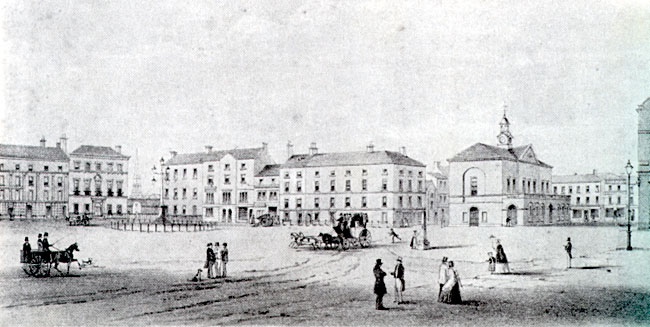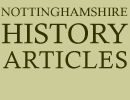< Previous
ELECTION SCANDAL IN RETFORD

Nearly two hundred years ago disgraceful riot and corruption in the East Retford elections resulted in a Cabinet split and the creation of the new Bassetlaw constituency. ADRIAN GRAY shows one way, at least, in which politics do appear to have improved.
Between 1790 and 1830 the name of East Retford came to be associated nationally with scandal and corruption. This was because the borough had the right to elect two MPs, with the voters being drawn from barely two hundred ‘freemen’ who qualified by virtue of having been born there as oldest sons, or through some apprenticeships. Given that the numbers were small and the vote done in a public poll, it became common to pay the voters. The system was manipulated to the advantage of the voters and ‘new voters’ strictly controlled, although many who did vote came from London to do so – and were paid for the trip!
East Retford was traditionally controlled by the Dukes of Newcastle who could get ‘their man’ elected by paying the local male electors. But the town was so corrupt even the Duke could not be sure – in the 1790s it was costing £4000 (£0.25m today) to get elected with barely 200 votes to pay for. In 1803 it was said votes cost 150 guineas each – over £5000 today. However in 1812 the Duke, who was a ‘Tory’, decided that the whole thing was becoming too expensive and this gave an opportunity for Earl Fitzwilliam to gain a political advantage for the Whigs. However we should not confuse the Whigs and Tories of those days with any political parties now; both were dominated by aristocrats with almost medieval views, and both used corrupt practices equally often.
That year Charles Marsh – unknown to almost everyone – was elected unopposed, but the verb ‘to marsh’ entered the dictionary meaning not to pay up on your promises! Even an election where there was no contest cost money – in 1820 the candidate William Evans paid out £4400 to his 210 supporters. Another phrase was to ‘joss’ – drinking at the candidates’ expense, often available for weeks before an election!
By 1824 Newcastle was showing renewed interest and wanted to challenge Fitzwilliam’s Whig control, especially as he had strong feelings about the sympathy the Whigs were showing to Roman Catholics. Fitzwilliam was tempted to use George Foljambe of Osberton as a candidate, but decided it was best NOT to have a local man: ‘the less the good freemen of Retford see of their Member, the more he is in their favour.’ He chose his own nephew, Sir Robert Dundas, and he had soon secured promises from 65 of the 94 freemen who lived in the town. Newcastle wondered about putting up £5000 to fund a candidate, but two of Retford’s aldermen told him not to bother as it was all a ‘done deal’ already!
George Hudson, a returning officer in 1825-6, told it as it was: ‘I should sit between the candidates, and I should have two large pockets, and them that put the most money in, I should vote for.’
Newcastle plainly decided that the ‘pro-Catholic’ Fitzwilliam Whig control had to cease. He helped form the ‘True Blue Club’ which met at the Turk’s Head in Retford and brought in Sir Henry Wright Wilson as a prospective candidate. With the curate, Rev Joshua Brooks, they stirred up anti-Catholic feeling leading to some street violence in December 1825 and the Riot Act being read twice. In February 1826 the Whig candidates were attacked in the street and Newcastle, who was Lord Lieutenant, did nothing to prevent it. In fact Fitzwilliam was well aware that the violence was stirred up by the Blues using ‘a hired mob of the scum of the neighbourhood….the most abandoned characters about Retford.’ The Whig Dundas had to hide in a Bank and Wilson arrived for polling in secret!
The 1826 election poll was held in public and fear was such that the Whig voters went together en masse – 123, or about 70% of the total. The two Whig candidates were attacked by the mob – it was clear they were going to win – and had to go into hiding while 150 Special Constables did nothing at all. Troops had to be brought in to calm things down.
As Wilson could not win, the True Blues brought a petition in alleging corruption. Finding the evidence was hardly difficult – 96 of 144 burgesses sold their votes - so both MPs were unseated and East Retford went a time without any. The Blues found many who could report that 20 guineas were handed out in special packages, but were then rather horrified to hear the suggestion that East Retford lose its MPs entirely – they would be transferred to Birmingham! A counter-proposal that a new Bassetlaw constituency be created caused a split between Huskisson and Peel in the Government.
In the end East Retford was merged into a new and larger Bassetlaw electorate although still called ‘East Retford’; there were 210 freeman voters and 2000 freeholders – who were liable to be ‘influenced’ by the local gentry. But this did not end the corruption; in 1830 Newcastle supported Arthur Duncombe and paid out about £4500 to get him elected, including providing a day’s coursing on the Clumber estate for the voters. As Duncombe lost his seat in 1831, this was hardly money well spent!
< Previous
